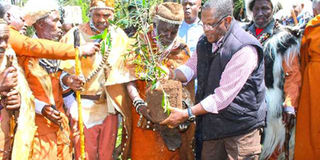Gikuyu holy site where life skills are propagated

Environment Cabinet Secretary Keriako Tobiko joins elders from the Kikuyu community in planting tress at a shrine in Mt Kenya Forest on August 10, 2019. PHOTO | FILE | NATION MEDIA GROUP
What you need to know:
- There is to be no idol worship, no carrying of idolatrous sculptures, and no cutting of trees, grazing or recreational camping.
- But people are reluctant to go and pray at the shrine for fear of being arrested by forest officers for trespassing. Some also believe it is not safe.
Kiambuthia village in Naro Moru, Nyeri County, is home to a revered site, which the Agikuyu have visited for eons for prayers and intercession.
Sitting on a 100-acre expanse at the foot of Mt Kenya, the Kiagonga gia Agikuyu shrine was recently handed over to Gikuyu elders by the government.
There are strict rules to be observed by all regarding this place. There is to be no idol worship, no carrying of idolatrous sculptures, and no cutting of trees, grazing or recreational camping.
The shrine is replete with cedar and cypress trees planted in straight lines all the way from the entrance to the all-weather River Tigithi.
The river runs right across the shrine and is of great significance to the elders and high priests, who have set up an altar near it.
The trees create a peaceful atmosphere, making it the perfect place for traditionalists and people of different faiths to pray.
RESTRICTIONS
Many people visit the shrine seeking divine intervention because they believe its closeness to Mt Kenya makes it holy.
Agikuyu traditionalists believe that their god dwells on Mt Kenya, which they refer to as Kirinyaga, which is short for Kirima kya Mwene Nyaga (God’s mountain).
Religious groups and tourists are welcome to the shrine, believed to draw them close to God.
Further in the shrine is an area with temporary fencing, with two gates. Both are locked and two signs warn trespassers that they enter it at their own peril.
Within it is the altar, which only the high priests can enter. Women are not allowed in the area, which is restricted to the Ndundu ya Agongoni (council of high priests).
A fig tree (mugumo) that stands out from the rest in the restricted area can be seen from afar.
INDEPENDENCE
The high priests offer sacrifices and perform other traditional rituals under the tree, which the Agikuyu believe is sacred.
The community believes that at the beginning of the struggle for independence in 1948, when the Mau Mau warriors went into the forest, they made a stopover at the shrine.
They put their machetes down and prayed to Mwene Nyaga, asking for guidance and protection before they went to war.
They promised to go back and build an altar at the same spot and offer a burnt sacrifice if He protected them, and they left the forest free, with the country independent.
However, years after Kenya became independent, the promise remains unfulfilled and the story of the unfulfilled promise has been passed down generations.
Then, in August 2017, the elders, led by co-ordinator Wambugu Nyamu, lobbied the government to hand the shrine over to them.
But it was not until August 10, 2019 that the State handed it over, with the council of high priests as custodians.
SAFETY ISSUE
Explaining why the shrine is open to Christians and other religious groups, Mr Nyamu says:
“Christianity impacted on us due to our belief in a divine being. Since the days of our forefathers, Gikuyu and Mumbi, we have had to appease God, just like Christians do; that is why they are welcome to pray there,” he said.
“The community is spiritual and we believe in putting God first in everything, so all our cultural activities such as weddings, funerals and initiations, among others, have a spiritual element,” he added.
He said many people are reluctant to go and pray at the shrine for fear of being arrested by forest officers for trespassing. Some also believe it is not safe.
“People are free to pray and be close to their god at their own convenience. The place is secure and no one is barred, except from the altar,” he said.
VALUE SYSTEM
Elders plan to use the shrine to teach about the importance of family. “We’re preserving and planting herbal and traditional trees such as gourds to help restore tradition. We also want people to pray facing the mountain to fully restore the traditional practice,” Mr Nyamu added.
Is there a site you want us to feature? Write an e-mail to [email protected]




